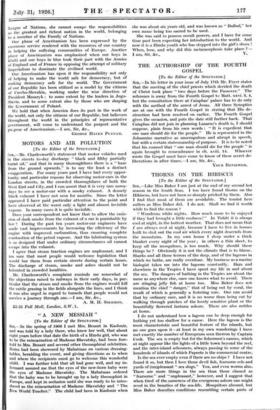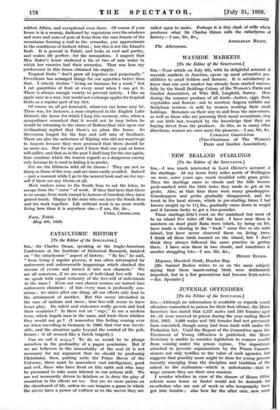THORNS ON THE HIBISCUS
[To the Editor of the SPECTATOR.] SIR,—Like Miss Baker I am just at the end of my second hot season in the South Seas. I too have found thorns on the Hibiscus, but have not been so sharply pricked by them. Also I find that most of them are avoidable. The tourist here suffers as Miss Baker did. I do not. Shall we find it worth while to find the reason ?
.` Wondrous white nights. How much more to be enjoyed if they had brought a little coolness ! " In Tahiti it is alwayv cool at night, in the hottest weather. That does not mean that I am always cool at night, because I have to live in houses built to shut out the cool air which every night descends from the mountains. In my own house I sleep under a thick blanket every night of the year ; in others a thin sheet, to keep off the mosquitoes, is too much. Why should these things be ? Obviously it is not the climate that is to blame. Sharks and all those terrors of the deep, and of the lagoons in which we bathe, are really overdone. My business as a marine biologist takes me into the lagoons constantly. Here and elsewhere in the Tropics I have spent my life in and about the sea. The dangers of bathing in the Tropics are about the same as anywhere else, once one knows what to avoid. There are stinging jelly fish at home too. Miss Baker does not mention the chief " danger," that of being cut by coral, the result of which is generally a festering sore. One can avoid that by ordinary care, and it is no worse than being cut by walking through patches of the lovely sensitive plant or the beautifully flowered lantana ashore. There are also nettles at home.
I do not understand how a lagoon can be deep enough for bathing yet too shallow for a canoe. Here the lagoon is the most characteristic and beautiful feature of the islands, but no one goes upon it—at least in my own wanderings I have met exactly the number of Europeans seen thereon by Captain Cook. The sea is empty but for the fishermen's canoes, which at night appear like the lights of a little town beyond the reef, and the inter-island schooners, always passing to some of the hundreds of islands of which Papeete is the commercial centre.
Is the sea ever empty. even if there are, no ships ? I have not found it so, but then I love those devil fish, fearsome eels and yards of (un)pleasant " sea slugs." Yea, and even worms also. There are more things in the sea than those classed as "fearsome" and "unpleasant," howeyer, and I suggest that when tired of the sameness of the evergreens ashore one might revel in the beauties of the sea-life. Mosquitoes abound, but Miss Baker describes conditions resembling certain parts of wildest Africa, and exceptional even there. Of course if your house is in a swamp, darkened by vegetation over the windows and rows and rows of pots of ferns from the rain forests of the mountains forming a wall to the verandas, you approximate to the conditions of darkest Africa ; but this is not the Island's fault. It is general in Tahiti, and looks so cool and pretty, and makes life perfect—for the mosquitoes. I suspect that- Miss Baker's house sheltered a tin or two of rain water in which her enemies had their nurseries. That was how my predecessor in this house obtained his supply.
Tropical fruits " don't grow all together and perpetually." Providence has arranged things for our appetites better than that. I utterly decline " living on bananas for a week," but I eat quantities of fruit at every meal when I can get it. There is always enough variety to prevent satiety. I like an apple once in a way, but would not exchange apples for tropical fruits as a regular part of my diet.
Of course we all get homesick, whatever our home may be. There was, for instance, a man employed in the English Lake District, the home for which I long this moment, who, when a sympathizer remarked that it would not be long before he would be returning to the slums of Bolton (that blot upon our civilization) replied that there's no place like home. So Stevenson longed for the fogs and soft rain of Scotland. There are also the sailormen of Kipling who did not wantto go to heaven because they were promised that there should be no more sea. But for my part I know that one year at home will suffice, and that as in the past I shall long for the sun again, that sunshine which the tourist regards as a dangerous enemy only because he is used to hiding it in smoke.
For me the Hibiscus with all its thorns ! They are not as sharp as those of the rose, and are more easily avoided. Indeed —just a moment while I go to the nearest bush and see for my- self if there are any thorns at all.
. Most visitors come to the South Seas to eat the lotus, to: escape from the " curse " of work. If they find here that there is no escape from work except to horrors of boredom they have gained much. Happy is the man who can have the South Seas and his work together. Life without work is no more worth living here than it is anywhere else.—I am, Sir, &c.,
Faaa, May 6th, 1926.
CYRIL CROSSLAND.



































 Previous page
Previous page